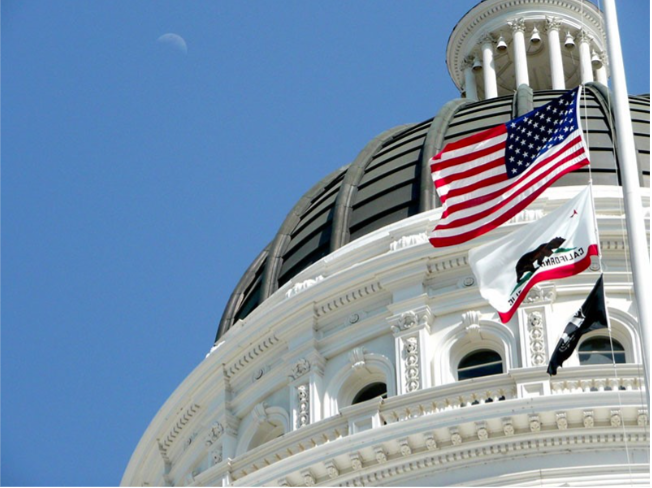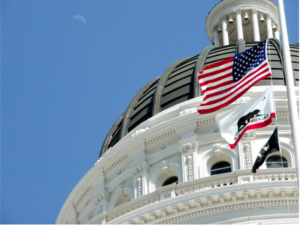March 25, 2024 Last Edit: July 22, 2024
Small business owners from across the Pine Tree State gathered in Augusta.

Welcome to the March 25-29 edition of the NFIB California Main Street Minute from your small-business-advocacy team in Sacramento.
Legislature Off for a Week
- The Legislature is on Spring Break this week, returning Monday, April 1, to finish up business for the year. Check here for the current list of 12 good-for-small-business bills NFIB California lobbying for and the 20 we are lobbying against.
Will Lipstick Make This Pig More Attractive?
- In an ideal world where markets make the best arbiters of wages and benefits, Assembly Bill 1228 would never have seen the light of day. But in that dystopia along the Sacramento River, the measure creating a first-in-the-nation Fast Food Council and boosting minimum wages of employees in fast-food enterprises to $20 an hour, starting next week, was hailed as manna from heaven brought down from the clouds by legislative apostles whose lack of experience running a business embarrassed them not in the least.
- Although the intense exposure of having a special exemption to the law inserted into the bill for the benefit of a chum of Gov. Gavin Newsom seems to be subsiding, what hasn’t abated is other businesses now wanting theirs, too. Beware of tinkering with the natural laws of business.
- Assembly Bill 610 is aimed at calming the waters. It would exempt additional restaurants in airports, hotels, event centers, theme parks, museums, and other locations from having to comply with all of AB 1228.
- After passing the Senate 31-4 and the Assembly 57-3 on bipartisan votes, AB 610 awaits the governor’s signature, which could have already come by the time you get around to reading this edition of the Main Street Minute. And because it has an emergency clause, AB 610 would become law immediately, not at the start of next year.
- In NFIB’s bill list mentioned above, AB 610 is the only one we have taken a neutral position on, because it helps ameliorate a bad law (AB 1228) that should never have been passed and which NFIB fought tooth and nail against.
The Governor
- Last week was a busy one for Governor Newsom, who saw his Proposition 1 finally pass more than two weeks after the March 5 Primary Election.
- As reported by the Associated Press, “Newsom, who made the measure a signature proposal, spent significant time and money campaigning on its behalf. He raised more than $13 million to promote it with the support of law enforcement, first responders, hospitals and mayors of major cities. Opponents raised just $1,000.”
- NFIB took no position on Proposition 1 (Why Doesn’t NFIB Take a Position on This Issue?), but we do have a lot of admiration for the spirited fight opponents of Prop. 1 put up, financially outgunned as they were, because NFIB more than occasionally finds itself in the same situation. This is not to say we’re lacking in big political cannons of our own. In fact, we have the biggest of them all—the sea of small-business owners we’re honored to represent. The Power of the Small Business Voice.
- Did the governor goof in putting Prop. 1 on the March ballot, instead of the November ballot? He eventually succeeded. But in his regular column in the Los Angeles Times, veteran Capitol watcher George Skelton believes he made a tactical error.
And, now to the state budget
- Also last week, Newsom, Senate President pro Tempore Mike McGuire, and Assembly Speaker Robert Rivas jointly announced serious work on the state’s budget deficit has commenced, specifics to come shortly. So far, NFIB has not heard the words ‘revenue enhancements’ (aka tax increases) issue from any of the men’s lips.
- Right now, there‘s only a paltry $1.2 billion in actual proposed cuts, indicating a serious dereliction of fiscal duty in the Legislature when we’re talking about such a massive deficit.
- “The three most powerful Democrats at the state Capitol came out Wednesday with a strange announcement. It boiled down to this: They’re working on a plan to address the state’s massive budget deficit by making some spending decisions this spring, long before the June deadline to pass a budget,” reported the Los Angeles Times.
— “But they didn’t say how much their plan will close the deficit — just that it will be in the range of $12 billion to $18 billion — or specify what cuts they’ll make.
— “The announcement was odd because it really just affirmed the obvious — staring at a deficit of at least $38 billion, Gov. Gavin Newsom and legislative leaders have been haggling over taking “early action” for weeks — while leaving out the most crucial details. Normally when the governor and both legislative leaders put out a joint statement on the budget it’s because they’ve reached a substantive agreement, so this announcement was more noteworthy for what it didn’t say than what it did.”
- California is currently staring down the barrel of a massive budget deficit. In 2022, California had a $100 billion budget surplus which has now flipped in two short years to a cumulative $100 billion budget shortfall. This is an unprecedented fiscal debacle in the history of our great state. The cause of that massive shift from feast to famine has been a combination of the government’s insatiable appetite to overspend coupled with a declining tax revenue stream that exists in no small measure because businesses are fleeing the state.
Calendar
- April 1 Legislature returns from Spring Recess
- May revise of the governor’s 2024-2025 proposed state budget. Date TBD
- May 24 deadline for bills to pass their house of origin (Assembly, Senate)
- June 15, midnight, constitutional deadline to pass 2024-2025 state budget
- June 27 deadline for ballot measure to qualify for November
- August 31 deadline for bills to have passed Legislature and sent to governor
- September 30 deadline for governor to sign bills into law
- November 5, General Election Day
National
Highlights from NFIB Vice President of Federal Government Relations Jeff Brabant’s report
- Last week, the House Judiciary Committee advanced the PROVE IT Act which would address loopholes in the Regulatory Flexibility Act. “Small businesses are often overlooked when analyzing new regulations and mandates from government agencies,” said Josh McLeod, NFIB Director of Federal Government Relations. “Small business owners have consistently ranked ‘unreasonable government regulations’ as one of their top concerns for running their businesses. The Prove It Act is a critical step in reducing the onerous regulation burdens and red tape small businesses face.” NFIB’s letter of support can be read here.
- Also last week, the House Education and Workforce Committee advanced legislation via the Congressional Review Act to repeal the Biden Administration’s Independent Contractor legislation. Earlier this month NFIB signed a coalition letter that would overturn this controversial rule which significantly limits the ability of small business owners to utilize independent contractors.
- The Washington Times published an op/ed from Beth Milito, executive director of NFIB’s Small Business Legal Center, drawing attention to many of the burdensome regulations that are harming small business owners.
This Main Street Minute can also be read on the NFIB California webpage here. Next Main Street Minute April 1.
NFIB is a member-driven organization advocating on behalf of small and independent businesses nationwide.
Related Articles















